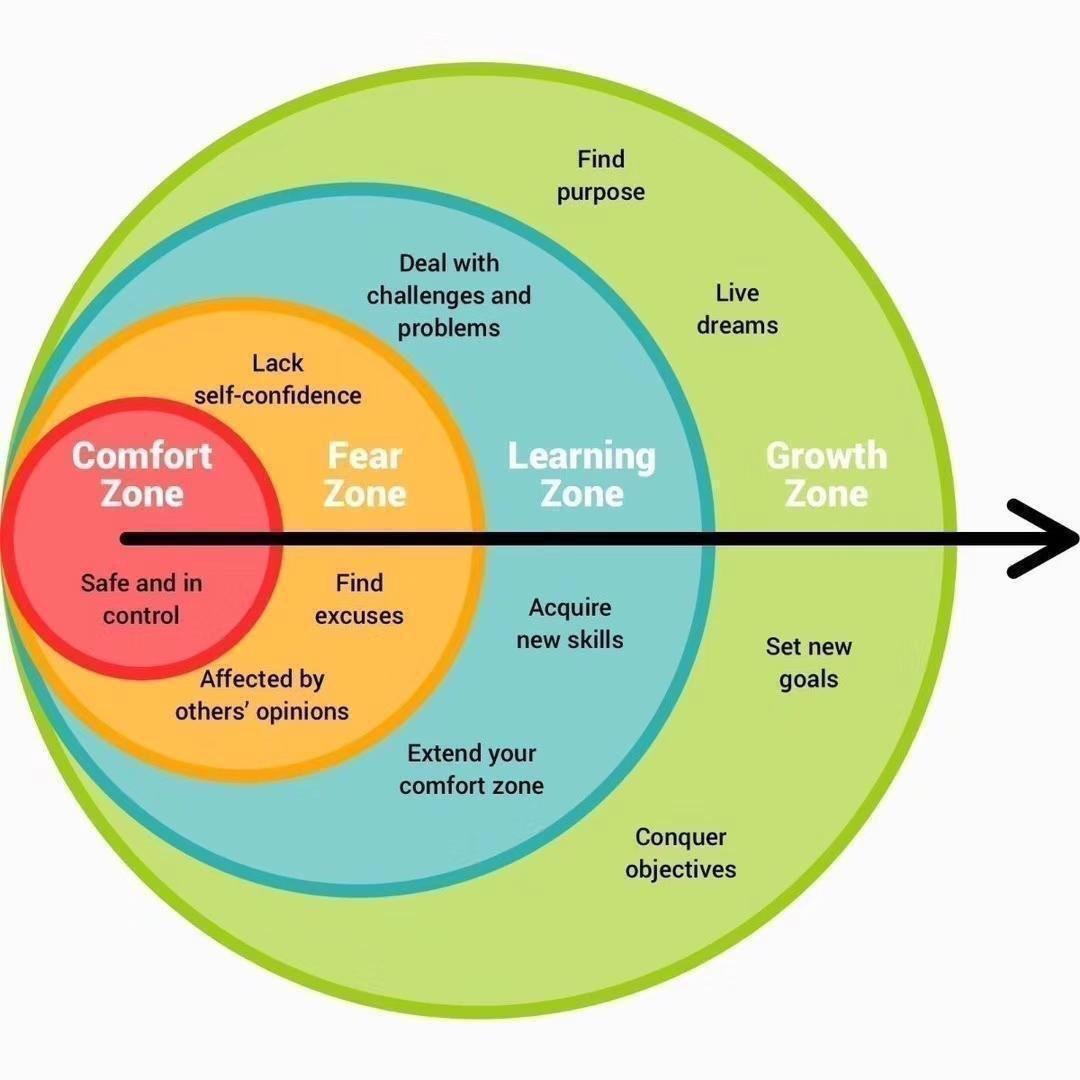Fear. See also courage.
Recently, I attended two events that focused on getting over fears and worked with several clients who were stuck, not moving forward because of fears. This, plus a handful of recent articles and posts on “getting out of your comfort zone” shows that fear plays a big part in our individual and collective psyches. Even accomplished executives say that fear sometimes gets in their way.
Let’s see if we can get to the bottom of this fear vs. leaving your comfort zone conundrum. Your comfort zone is a state where you feel safe and in control. That sounds good, but in the comfort zone, you also find nothing too challenging, and learn nothing new. This diagram was all over social media in the past two months if you follow management and leadership topics. According to this diagram (mainly unattributed, but sometimes attributed to the TheWealthHike.com), you have to get out of the comfort zone and go through the fear zone to get to the learning zone and the growth zone. It looks neat and clean in the diagram, but people get stuck in the “Fear Zone.”
“I learned that courage was not the absence of fear, but the triumph over it. The brave man is not he who does not feel afraid, but he who conquers that fear.”
So, what is everybody so afraid of? The number of things a person can be afraid of is equal to the number of things – seemingly infinite. In a work setting, your fears are unlikely to be related to heights or spiders unless you are a sky-diver or an arachnologist. Some common fears include fear of looking stupid/silly, fear of failure, fear of loss, and sometimes even fear of success. While the knowledge that everybody experiences fear may provide some comfort, mustering the courage to get over your own fears can be difficult and not at all straightforward. The first step is to explore what it is that we are really afraid of. Making a presentation in itself is not scary, but the possibility of publicly making mistakes and the possible reactions of others can be very scary indeed. Understanding your fear will help you choose a way to manage it.
There is no one way to approach and move beyond fear. You’ve heard of our natural “fight or flight” response to fear, but those two choices really only help if you are in some type of imminent danger where the threat is clear and objective. The “threats” that produce anxiety in an office setting are subjective: approaching a difficult conversation, making a presentation, or taking on a new responsibility. Subjective threats involve emotions and thoughts, both helpful and not. So, what do we do to overcome fear, build confidence and leave our “comfort zone?”
Exposure/practice: The most common approach to overcoming fear comes from cognitive behavior theory – expose yourself to the thing you fear. A clear example of this is fear of public speaking, which may be faced by making more speeches and presentations. Some other activities we are afraid of may be a little more complicated, and we may not have enough control over them to count on exposing ourselves more, like giving negative feedback.
Preparation: Learn what you can about the fear-inducing task. If it’s a job interview, learn about the company on line, ask friends who work there what it’s like, and read over the job description, making connections to your own experience. If it’s leading a new project, learn about the strengths of your staff, the requirements of the project and whatever you can. Being as prepared as possible will make the task less frightening.
Reality check: Ask yourself why the task is frightening. Have other people done it before? Were they smarter, tougher, harder working than you? Have you done something similar before? How did it go? What did you learn that could help you this time? What is the worst thing that could happen? Sometimes, the stakes seem high, but in the big scheme of things, failure would not be that bad: management does not like your idea, you may be embarrassed, you don’t get a bonus, you fumble delivering a speech. Are the consequences really worse than experiences you have had before?
Small steps: Some tasks are daunting because they seem too large. If you are writing a book, it may seem impossible, but if you write for a minimum of one hour each day, it seems possible. Some ways to break a task down are by time period/day, breaking it into smaller tasks, or measuring intermediate milestones. If you have a goal to do a certain task each day, count the number of days you succeed each week rather than rating it a failure if you complete less than seven.
Community/support: A task can seem less daunting if you have help. Some people enjoy greater success if they tell someone about their goal so that they feel accountable to complete it. Some will complete a goal more effectively if they have company, like people who work out together.
Psych yourself up: What gets your juices flowing? Whatever it is, do that. If you’re walking into a difficult meeting and physical activity gets you pumped up, do a few push-ups or take a quick walk around the block to get yourself ready. Some people get psyched up with affirmations. This doesn’t have to be something carefully designed in a coaching session. A simple, “you can do this!” might be enough.
Whatever method you choose to face your fears, remember that you can’t demonstrate courage without first feeling fear.



